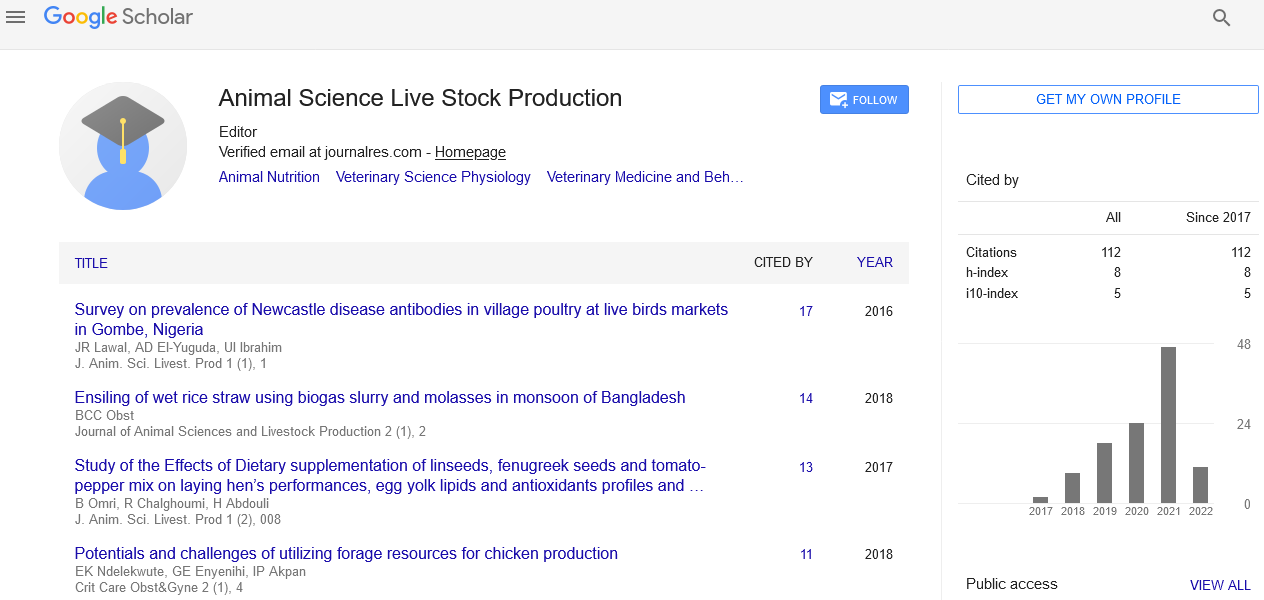Short Communication - (2024) Volume 8, Issue 3
The Importance of Animal Nutrition: A Comprehensive Overview
Takumi Fujimoto*
Department of Animal Sciences, Kyoto University, Japan
*Correspondence:
Takumi Fujimoto,
Department of Animal Sciences, Kyoto University,
Japan,
Email:
Received: 02-Sep-2024, Manuscript No. IPJASLP-24-21381;
Editor assigned: 04-Sep-2024, Pre QC No. IPJASLP-24-21381 (PQ);
Reviewed: 18-Sep-2024, QC No. IPJASLP-24-21381;
Revised: 23-Sep-2024, Manuscript No. IPJASLP-24-21381 (R);
Published:
30-Sep-2024, DOI: 10.36648/2577-0594.8.3.21
Introduction
Animal nutrition is a cornerstone of modern livestock
management, influencing both the health of animals and the
efficiency of production systems. Proper nutrition ensures that
animals receive the essential nutrients needed for growth,
reproduction, and overall well-being. As agriculture advances,
understanding the intricacies of animal nutrition becomes
increasingly vital to optimizing livestock performance and
ensuring sustainable food production. Each plays a unique role
in maintaining health and supporting physiological functions.
Carbohydrates are the primary energy source for animals,
providing fuel for growth and maintenance. They are found in
feedstuffs like grains and forage. Proteins are crucial for growth,
repair, and maintenance of body tissues. They are composed of
amino acids, some of which are essential and must be supplied
through diet. Fats, also known as lipids, provide a concentrated
energy source and are essential for the absorption of fatsoluble
vitamins.
Description
Vitamins are organic compounds required in small amounts
but are vital for metabolic processes. Minerals like calcium,
phosphorus, and potassium are crucial for bone health, muscle
function, and overall metabolic balance. Lastly, water is the
most essential nutrient, constituting a significant portion of
an animal’s body and required for all physiological functions.
A balanced diet is critical for optimizing animal health and
productivity. Nutritional requirements vary depending on
species, age, sex, and physiological status (e.g., lactating or
pregnant animals). For instance, dairy cattle require diets rich
in calcium and phosphorus to support milk production and
bone health, while growing pigs need high protein levels to
support rapid growth. To achieve a balanced diet, nutritionists
formulate rations based on the nutrient content of available
feedstuffs and the specific needs of the animal. This involves
careful consideration of feed composition, including the
digestibility and bioavailability of nutrients. Feed formulations
often incorporate various ingredients such as grains,
oilseeds, by-products, and supplements to meet nutritional
requirements. Recent advancements in animal nutrition
include the development of precision feeding technologies
and enhanced feed additives. Precision feeding utilizes data on
individual animal requirements to tailor diets more accurately,
improving feed efficiency and reducing waste. This approach
helps optimize growth rates, reproductive performance, and
overall health. Feed additives, such as probiotics and prebiotics,
have gained prominence for their role in promoting gut health
and enhancing nutrient utilization. Probiotics introduce
beneficial microorganisms to the gut, while prebiotics serve as
food for these microorganisms, supporting a healthy microbial
balance. Furthermore, research into alternative feed sources,
such as insect meal and algae, aims to address sustainability
challenges associated with traditional feed ingredients. These
novel sources offer potential benefits in terms of nutrient
density and environmental impact [1-4].
Conclusion
Despite advances in animal nutrition, challenges persist.
Issues such as feed ingredient variability, nutrient deficiencies,
and environmental impacts require ongoing attention. For
example, the environmental footprint of livestock production,
including greenhouse gas emissions and land use, prompts a
need for more sustainable feeding practices. Future directions
in animal nutrition research may focus on enhancing feed
efficiency, developing sustainable feed alternatives, and
integrating nutritional strategies with broader management
practices. Innovations in genomics and biotechnology could
further refine our understanding of nutrient requirements
and optimize feeding strategies. Animal nutrition is a dynamic
field that plays a crucial role in the health and productivity
of livestock. As research and technology continue to evolve,
the principles of animal nutrition will remain fundamental to
advancing livestock management and ensuring the global food
supply.
Acknowledgement
None.
Conflict Of Interest
None.
References
- Eisen RJ, Kugeler KJ, Eisen L, Beard CB, Paddock CD (2017) Tick-borne zoonoses in the United States: Persistent and emerging threats to human health. ILAR J. 58(3):319-335.
[Crossref] [Google Scholar] [PubMed]
- Carson DA, Kopsco H, Gronemeyer P, Mateus-Pinilla N, Smith GS (2022) Knowledge, attitudes, and practices of Illinois medical professionals related to ticks and tick-borne disease. One Health. 15:100424.
[Crossref] [Google Scholar] [PubMed]
- Landero JL, Wang LF, Beltranena E, Zijlstra RT (2011) The effect of feeding solvent-extracted canola meal on growth performance and diet nutrient digestibility in weaned pigs. Anim Feed Sci Technol. 99(5):skab135.
[Crossref] [Google Scholar]
- van der Werf J (2007) Animal breeding and the black box of biology. J Anim Breed Genet 124(3):101.
[Crossref] [Google Scholar] [PubMed]
Citation: Fujimoto T (2024) The Importance of Animal Nutrition: A Comprehensive Overview. J Animal Sci. 8:21.
Copyright: © 2024 Fujimoto T. This is an open-access article distributed under the terms of the Creative Commons Attribution License, which permits unrestricted use, distribution, and reproduction in any medium, provided the original author and source are credited.

